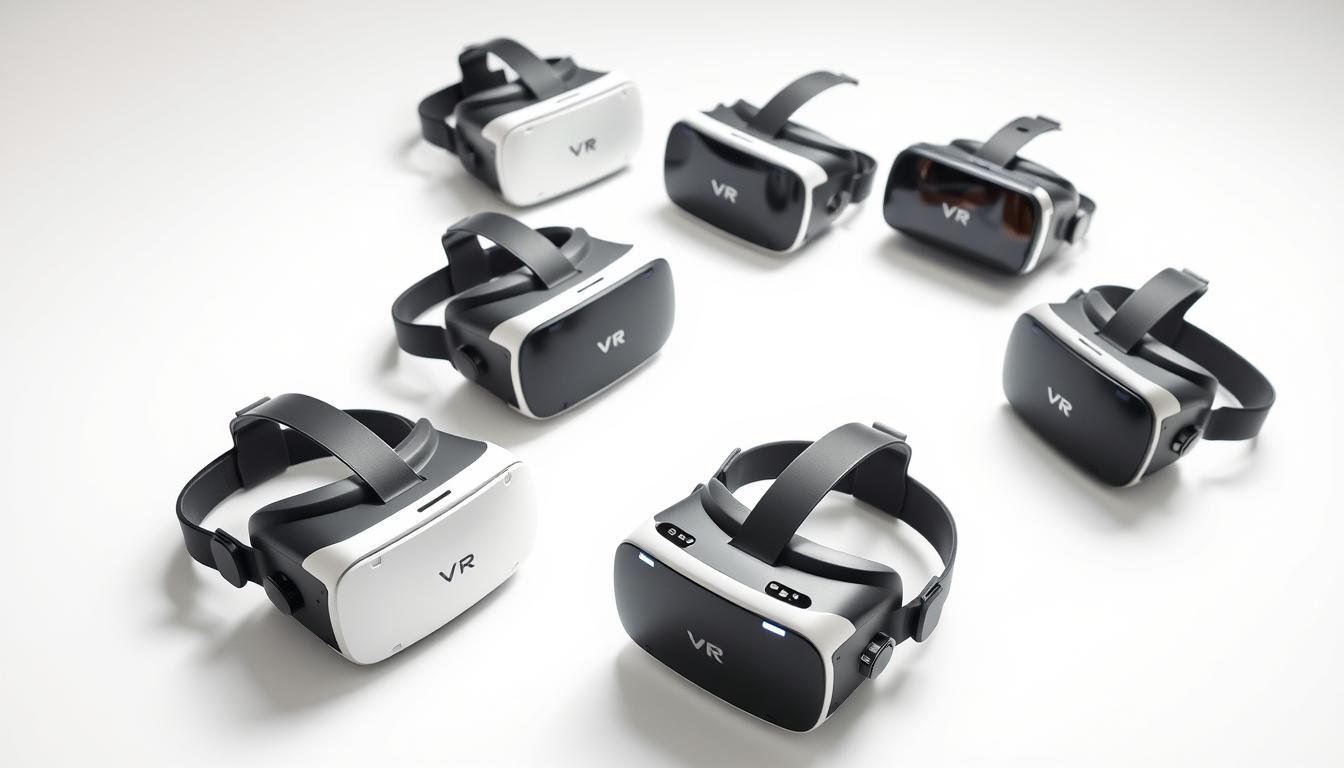Did you know that global shipments of VR devices are projected to reach 9.6 million units in 2024? Virtual reality is no longer a niche tech; it’s becoming a mainstream experience. Whether you’re diving into immersive gaming or exploring new worlds, the right headset can make all the difference.
This article reviews ten top-performing options, focusing on both price and performance. We’ll highlight the latest deals, including the Meta Quest 2’s record price drop, and exclusive offers that make these devices more accessible than ever. From standalone models to those requiring additional hardware, there’s something for everyone.
Brands like Meta, HTC, and PlayStation dominate the market, offering a range of features to suit different needs. Whether you’re after high-quality visuals, smooth movement tracking, or a budget-friendly entry point, this guide has you covered. Designed with newcomers in mind, it’s your go-to resource for navigating the world of VR.
Key Takeaways
- Global VR headset shipments are expected to hit 9.6 million units in 2024.
- The Meta Quest 2 has seen significant price reductions, making it a great option for beginners.
- This guide covers ten top-performing headsets, balancing price and performance.
- Brands like Meta, HTC, and PlayStation offer diverse features to suit various needs.
- Latest deals and exclusive offers are highlighted to help you save.
Introduction to Affordable VR Headsets for First-Time Buyers
For newcomers, stepping into virtual reality has never been easier or more budget-friendly. The market for accessible devices is expanding rapidly, with brands like Meta, HTC, and PlayStation leading the charge. These companies are offering devices that balance cost and performance, making it simpler for first-time users to dive into immersive experiences.
One of the most popular options is the Meta Quest 2, known for its standalone design and extensive game library. It’s a great choice for those who want a hassle-free setup. Other models, like the HTC Vive series, offer higher-end features such as improved tracking and resolution, catering to users who prioritise quality.
When choosing a headset, key factors to consider include resolution, refresh rate, and tracking capabilities. These elements ensure smooth visuals and responsive controls, enhancing your overall experience. Additionally, many devices now come with promotional deals, making them even more accessible.
“The rise of affordable VR technology is transforming how we interact with digital worlds, offering immersive experiences without breaking the bank.”
Here’s a quick comparison of some popular options:
| Model | Resolution | Refresh Rate | Tracking |
|---|---|---|---|
| Meta Quest 2 | 1832 x 1920 per eye | 90Hz | Inside-out |
| HTC Vive Cosmos | 2880 x 1700 | 90Hz | Outside-in |
| PlayStation VR 2 | 2000 x 2040 per eye | 120Hz | Inside-out |
This guide will walk you through the best options available, helping you find the perfect headset to start your virtual journey. Whether you’re gaming, exploring apps, or simply curious about VR, there’s a device tailored to your needs.
The Evolution of VR and Its Affordable Options
Over the years, virtual reality has evolved from clunky prototypes to sleek, user-friendly devices. Early experiments in the 1960s laid the groundwork, but it wasn’t until the 2010s that the tech truly took off. The Oculus Rift Development Kit marked a turning point, bringing VR into the public eye.
Since then, advancements in resolution, refresh rate, and tracking have made devices like the HTC Vive and Meta Quest series more accessible. These improvements have not only enhanced the experience but also driven down costs, making VR a viable option for many.
One of the most significant shifts has been the move from tethered systems to standalone devices. The Meta Quest 2, for example, offers a seamless setup without the need for external hardware. This transition has been a game-changer, especially for first-time users.
“The rise of standalone VR devices has democratised access to immersive technology, making it easier than ever to dive into virtual worlds.”
Software libraries and developer support have also played a crucial role. With a growing library of apps and games, devices like the PlayStation VR and Valve Index offer diverse content to suit various interests. This has further boosted the appeal of VR for both gaming and productivity.
Looking ahead, mixed reality integration is set to redefine the field. Combining virtual and physical environments, this innovation promises to expand the possibilities of what VR can achieve. For those interested in exploring affordable options, this guide offers valuable insights.
| Device | Key Feature | Impact |
|---|---|---|
| HTC Vive | High-resolution screen | Enhanced visual clarity |
| Meta Quest 2 | Standalone design | Ease of use and portability |
| PlayStation VR | Extensive game library | Diverse content options |
From early experiments to modern innovations, the journey of VR has been remarkable. Today, devices are more affordable and accessible, offering a gateway to immersive experiences for everyone.
Key Features to Look For in a VR Headset
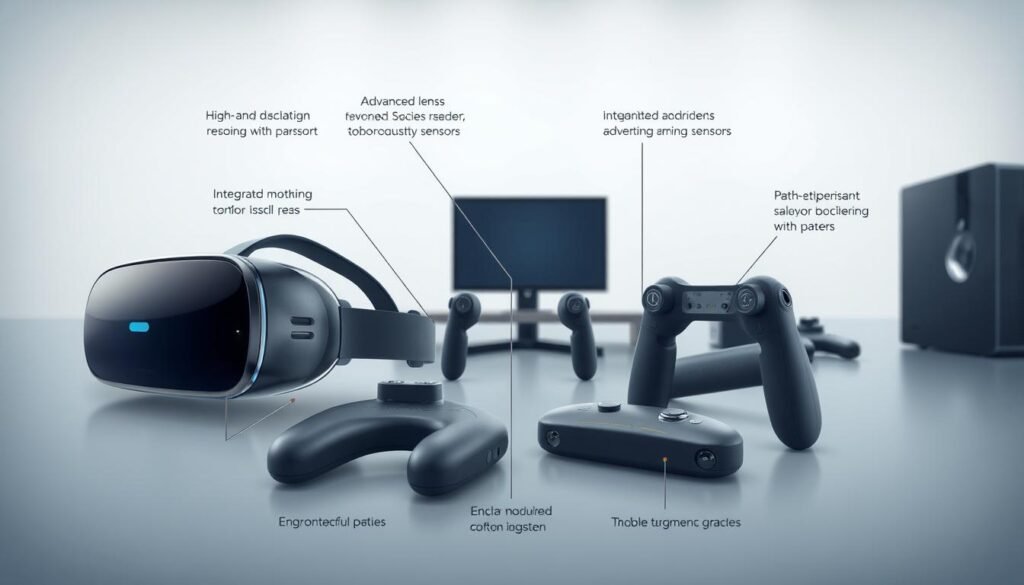
Technical specifications play a crucial role in determining the quality of your virtual world. Understanding these features ensures you choose a device that delivers a smooth and immersive experience. Let’s break down the essentials.
Resolution, Refresh Rate, and Field of View
Resolution is one of the most critical factors. It determines the clarity of the visuals you see. For instance, the Meta Quest 3 offers a resolution of 2064 x 2208 per eye, providing sharp and detailed images. A higher resolution reduces the “screen door effect,” where you can see the gaps between pixels.
Refresh rate is equally important. It measures how many times the display updates per second. A higher refresh rate, like the 120Hz on the PlayStation VR 2, ensures smoother motion, reducing motion sickness and enhancing immersion.
Field of view (FOV) defines how much of the virtual world you can see at once. Most devices offer an FOV between 100° and 110°, but the Valve Index pushes this to 130°, creating a more realistic experience.
Wireless Functionality and Processing Capabilities
Wireless functionality offers freedom of movement, making it easier to explore virtual environments without being tethered to a PC. The Meta Quest 2 is a standout example, providing a seamless standalone experience.
Processing capabilities vary between standalone and tethered devices. Standalone models like the Meta Quest 3S have built-in processors, while tethered devices like the Valve Index rely on a connected PC for power. This impacts the quality of graphics and the complexity of apps you can run.
| Model | Resolution | Refresh Rate | Field of View |
|---|---|---|---|
| Meta Quest 3 | 2064 x 2208 per eye | 90Hz | 110° |
| PlayStation VR 2 | 2000 x 2040 per eye | 120Hz | 110° |
| Valve Index | 1440 x 1600 per eye | 144Hz | 130° |
When choosing a device, consider how these features align with your needs. Whether you prioritise resolution for sharp visuals or a wide FOV for immersion, understanding the tech ensures you get the best experience. For more insights, explore the best VR headset options available today.
Meta Quest 2: The Leading Affordable Choice
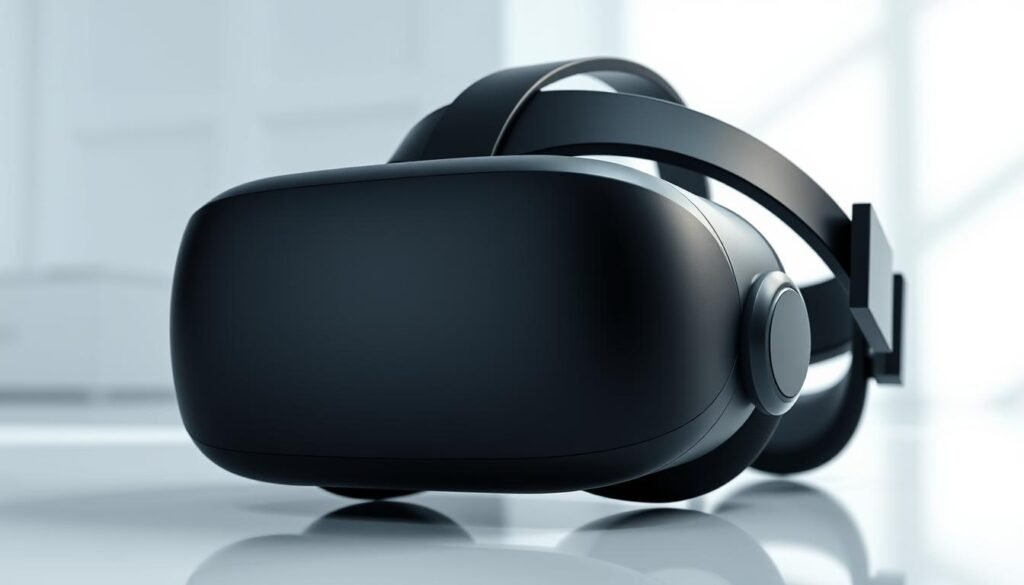
The Meta Quest 2 has become a go-to option for those diving into virtual worlds for the first time. Its combination of performance, ease of use, and affordability makes it a standout choice. Whether you’re exploring immersive games or productivity apps, this device delivers a seamless experience.
Performance Highlights and Game Library
The Meta Quest 2 boasts a resolution of 1832 x 1920 per eye, ensuring sharp visuals. Its 90Hz refresh rate provides smooth motion, reducing motion sickness during extended use. The standalone design means no external hardware is required, making it incredibly user-friendly.
Its game library is one of the most extensive in the market. Titles like Beat Saber and Resident Evil 4 VR offer hours of entertainment. The device’s responsive controller enhances gameplay, making it a favourite among gamers.
Bundled Deals and Exclusive Offers
Recent price drops have made the Meta Quest 2 even more accessible. Prices now start at $199/£199, a record low for this model. Meta also offers bundled deals, such as including Beat Saber with your purchase, adding extra value.
Here’s a quick comparison of available bundles:
| Bundle | Included Items | Price |
|---|---|---|
| Standard | Headset, Controllers | $199/£199 |
| Beat Saber Bundle | Headset, Controllers, Beat Saber | $249/£249 |
For first-time users, the Meta Quest 2 offers an unbeatable balance of performance and affordability. Its versatility as both a gaming and general experience device ensures it’s a worthwhile investment.
PlayStation VR 2: A Specialist for Console Gamers
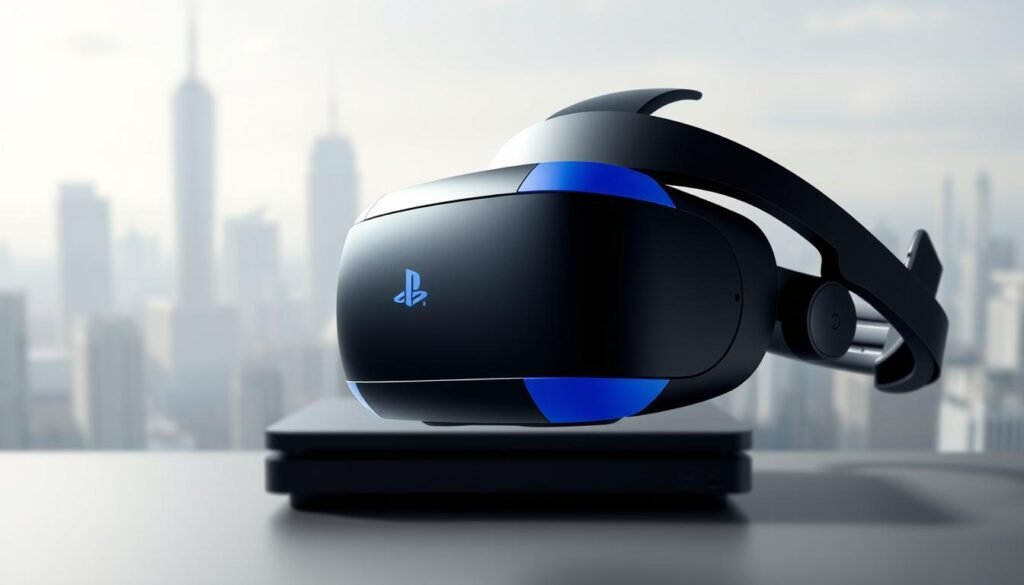
The PlayStation VR 2 brings a new level of immersion to console gaming. Designed specifically for the PS5, it combines advanced technology with seamless integration, making it a top choice for dedicated gamers. With features like eye-tracking and a high-resolution OLED display, it’s built to enhance your gaming experience.
Design, Comfort, and Eye-Tracking Features
The PSVR 2 introduces significant improvements over its predecessor. Its ergonomic design ensures comfort during extended play sessions. The adjustable headband and balanced weight distribution reduce strain, making it ideal for long gaming marathons.
One of the standout features is its integrated eye-tracking technology. This allows for more intuitive interactions, such as navigating menus or aiming in games, simply by moving your eyes. Combined with the OLED display, it delivers stunning visuals with a resolution of 2000 x 2040 per eye and a refresh rate of up to 120Hz.
Software Ecosystem and Gaming Integration
The PSVR 2 works seamlessly with the PlayStation 5, offering a plug-and-play setup. It comes bundled with the PSVR 2 Sense controllers, which provide haptic feedback and adaptive triggers for a more immersive experience. The growing game library includes exclusive titles like Horizon Call of the Mountain and Resident Evil Village VR.
Here’s a quick comparison of its technical specifications:
| Feature | PlayStation VR 2 | Meta Quest 2 |
|---|---|---|
| Resolution | 2000 x 2040 per eye | 1832 x 1920 per eye |
| Refresh Rate | 90Hz – 120Hz | 90Hz |
| Tracking | Inside-out | Inside-out |
At a price of $549.99/£529.99, the PSVR 2 is a premium option for console gamers. Its robust software ecosystem and cutting-edge features make it a worthwhile investment for those seeking the best in virtual gaming.
“The PlayStation VR 2 sets a new standard for console-based virtual reality, offering unparalleled immersion and comfort.”
Whether you’re exploring expansive worlds or battling enemies, the PSVR 2 delivers an experience that’s hard to match. For console gamers willing to invest, it’s the ultimate gateway to virtual worlds.
HTC Vive Series: Bridging Quality and Price
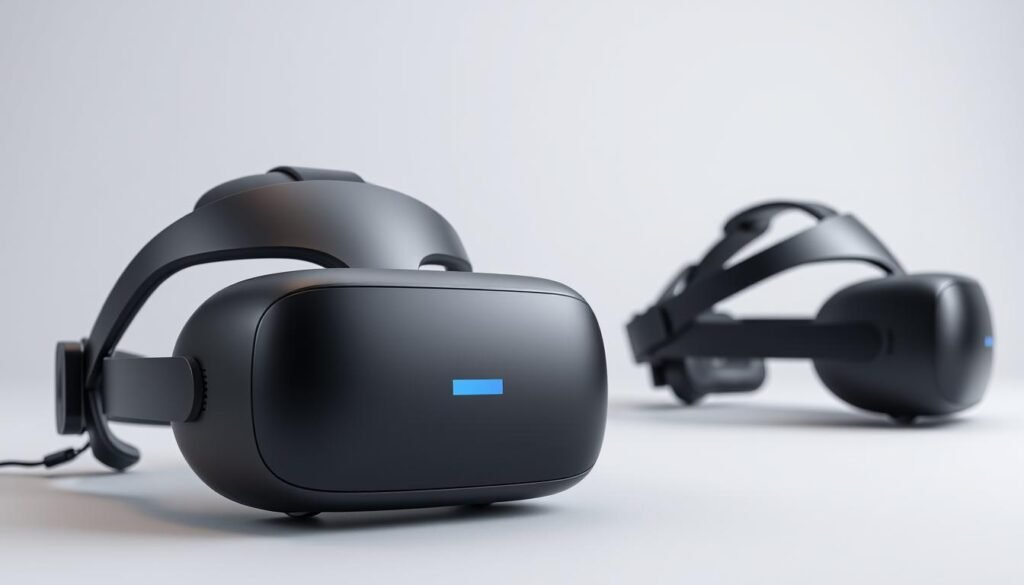
The HTC Vive Cosmos and Cosmos Elite offer distinct features for different user needs. Both models are part of the HTC Vive series, known for its premium quality and immersive experiences. Whether you’re a seasoned enthusiast or a newcomer, these devices provide a solid entry point into virtual worlds.
Cosmos vs Cosmos Elite: A Comparative Look
The Cosmos and Cosmos Elite cater to varying preferences, particularly in tracking and resolution. The standard Cosmos uses inside-out tracking, which is convenient for users who prefer a simpler setup. In contrast, the Cosmos Elite features external tracking, offering more precise movement detection for demanding applications.
When it comes to display quality, both models deliver sharp visuals. The Cosmos boasts a resolution of 2880 x 1700, while the Cosmos Elite matches this with the same screen clarity. However, the Elite’s external tracking system enhances the overall experience, making it ideal for users who prioritise accuracy.
| Feature | Cosmos | Cosmos Elite |
|---|---|---|
| Resolution | 2880 x 1700 | 2880 x 1700 |
| Tracking | Inside-out | External |
| Controller | Standard | Enhanced |
Both models support a robust game library, ensuring access to a wide range of content. The Cosmos is a great option for those seeking value, while the Elite appeals to users who want the best in tracking and performance.
Pricing differences also play a role. The Cosmos is more budget-friendly, starting at $699, while the Elite is priced at $899. However, the Elite often includes bundled accessories, adding extra value for the price.
“The Cosmos Elite’s external tracking system sets it apart, offering unparalleled precision for immersive experiences.”
In conclusion, the choice between the Cosmos and Cosmos Elite depends on your needs. If you value simplicity and cost-effectiveness, the Cosmos is a solid pick. For those who demand precision and are willing to invest, the Elite is the better option.
Smartphone-Powered VR: Exploring Entry-Level Solutions
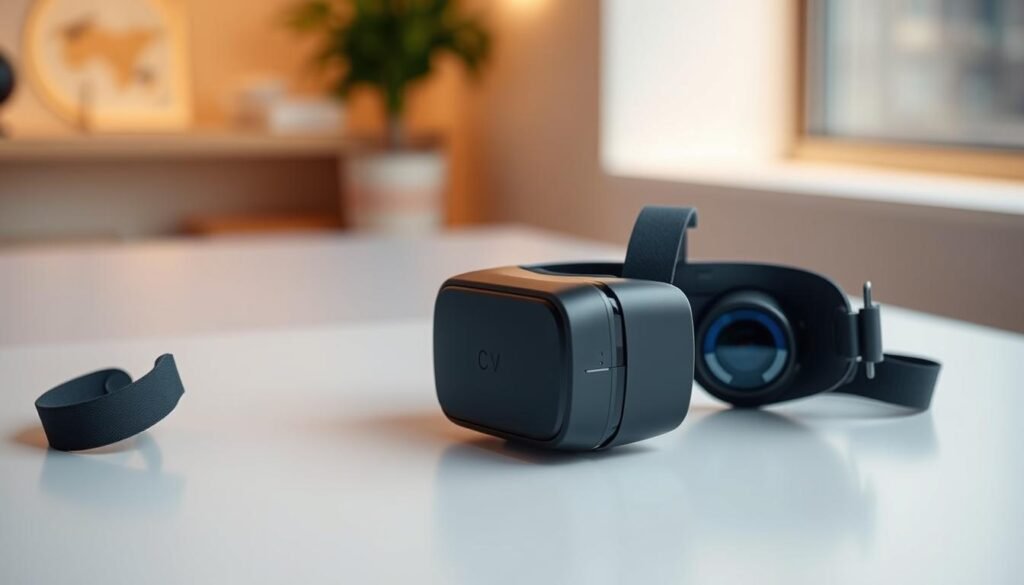
Smartphone-powered VR headsets have become a popular entry point for exploring virtual worlds. These devices use your mobile phone as the screen and processor, making them an affordable and accessible option for newcomers. While they may not match the experience of dedicated headsets like the Meta Quest or HTC Vive, they offer a simple way to dip your toes into virtual reality.
App Compatibility and User Experience
One of the key advantages of smartphone-powered VR is app compatibility. Both Android and iOS platforms support a wide range of VR apps, from immersive games to educational tools. Apps like Google Cardboard and YouTube VR allow you to explore 360-degree videos and interactive content. However, the experience is often limited by your phone’s resolution and processing power.
Dedicated headsets like the Meta Quest or PlayStation VR offer smoother performance and higher-quality visuals. Smartphone-powered devices, on the other hand, rely on your phone’s hardware, which can result in lower frame rates and less immersive experiences. Despite these limitations, they remain a great starting point for those curious about VR.
Screen Size and Resolution
The quality of your VR experience largely depends on your phone’s screen size and resolution. Larger screens provide a wider view, while higher resolutions reduce pixelation and improve clarity. For example, a phone with a 1440p display will deliver sharper visuals than one with a 1080p screen. However, even the best smartphone screens can’t match the dedicated displays found in devices like the HTC Vive or Meta Quest.
Entry-Level Models and Pricing
Several entry-level models are available, each offering a unique balance of features and affordability. The Google Cardboard, for instance, is a budget-friendly option that works with most smartphones. More advanced models like the Samsung Gear VR provide better comfort and compatibility but come at a higher price point.
| Model | Compatibility | Price |
|---|---|---|
| Google Cardboard | Android, iOS | £10-£20 |
| Samsung Gear VR | Samsung smartphones | £50-£100 |
While smartphone-powered VR headsets have their limitations, they are an excellent way to explore virtual reality without a significant investment. They offer a glimpse into the possibilities of VR, making them a great choice for first-time users.
“Smartphone-powered VR headsets provide an accessible gateway to virtual reality, allowing users to explore immersive content without breaking the bank.”
In conclusion, these devices are a practical starting point for anyone curious about VR. They may not deliver the same level of immersion as dedicated headsets, but they are a cost-effective way to experience the basics of virtual worlds.
VR Headsets and Mixed Reality Integration
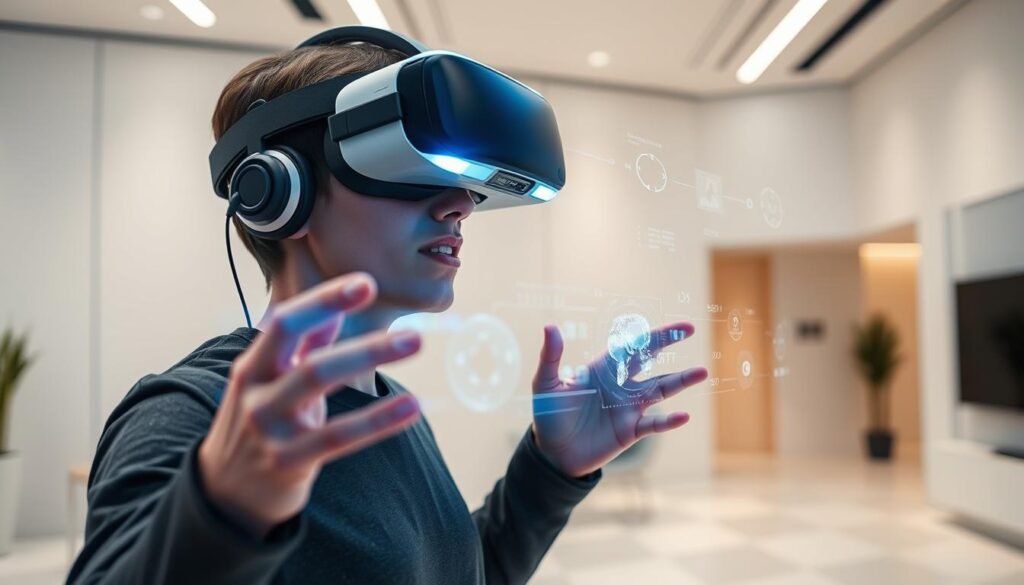
Mixed reality is reshaping how we interact with digital and physical worlds. Unlike traditional virtual reality, which immerses you in a fully digital environment, mixed reality blends virtual elements with the real world. This creates a more dynamic and interactive experience, allowing you to see and interact with both realms simultaneously.
Modern headsets like the Meta Quest 3 and Apple Vision Pro are leading this transformation. The Meta Quest 3, for instance, uses passthrough cameras to overlay virtual objects onto your physical surroundings. This feature is perfect for games and apps that require real-world interaction. Similarly, the Apple Vision Pro integrates advanced sensors and displays to create a seamless blend of AR and VR.
Passthrough cameras are a key component of mixed reality. They capture your environment in real-time and project it onto the headset’s display. This allows virtual objects to appear as if they exist in your physical space. For example, you could place a virtual screen on your wall or interact with digital characters in your living room.
However, integrating mixed reality comes with challenges. The technology requires high processing power and precise tracking to ensure smooth interactions. Devices like the HTC Vive series have addressed this by incorporating external sensors and advanced algorithms. Despite these hurdles, the benefits—such as enhanced immersion and practical applications—make it a worthwhile endeavour.
“Mixed reality is the next frontier in immersive technology, offering endless possibilities for gaming, productivity, and beyond.”
Looking ahead, the industry is moving towards more hybrid devices. Companies like Samsung are developing projects that further blend AR and VR elements. This trend promises to make mixed reality more accessible and versatile, opening doors to new experiences and applications.
In summary, mixed reality is revolutionising the way we use headsets. With devices like the Meta Quest 3 and Apple Vision Pro leading the charge, the future of immersive technology looks brighter than ever. Whether you’re gaming, working, or exploring, mixed reality offers a glimpse into a world where the digital and physical seamlessly coexist.
Understanding the Available Game and App Libraries
From immersive gaming to productivity tools, VR libraries are expanding rapidly. The variety of apps and games available for different headsets has transformed how we interact with digital content. Whether you’re exploring virtual worlds or enhancing your workflow, the depth of a library can significantly influence your overall experience.
Diverse Gaming Options
Gaming remains a cornerstone of the VR experience. Platforms like Meta’s Horizon and PlayStation’s ecosystem offer a wide range of titles, from action-packed adventures to relaxing simulations. Popular games such as Beat Saber and Half-Life: Alyx have become system sellers, driving headset sales and user engagement.
Exclusive titles also play a crucial role. For instance, the PlayStation VR 2 boasts games like Horizon Call of the Mountain, which showcase the device’s capabilities. These exclusives not only enhance the experience but also make specific platforms more appealing to users.
Productivity and Entertainment Programmes
Beyond gaming, VR is increasingly used for productivity and entertainment. Apps like KORG Gadget allow users to create music, while platforms like InkyPen offer access to a vast library of comics. These tools demonstrate how VR can be a versatile device for both work and leisure.
Productivity apps are also gaining traction. For example, the Apple Vision Pro integrates advanced features for multitasking and virtual collaboration. This shift highlights how VR is evolving beyond just gaming, offering practical applications for everyday use.
“The richness of a VR library can significantly influence your overall experience, making it a key factor in choosing the right device.”
In conclusion, the quality and diversity of a headset’s content library are critical to its appeal. Whether you’re a gamer, a creative professional, or someone looking to explore new technologies, the right apps and games can elevate your VR journey.
Accessory and Controller Innovations in VR Technology
Innovations in accessories and controllers are transforming the way you experience virtual worlds. From precision tracking to ergonomic designs, these advancements are making reality more immersive than ever. Whether you’re a seasoned user or new to the device, these improvements enhance every interaction.
New controller designs offer improved precision and finger-tracking. For example, the HTC Vive Cosmos Elite features enhanced tracking systems that provide more accurate movement detection. Similarly, the Valve Index controllers allow for natural hand gestures, making your virtual interactions feel more intuitive.
Ergonomic improvements are another key focus. Devices like the PSVR 2 Sense controller are designed for comfort during long sessions. Adjustable headbands and balanced weight distribution reduce strain, ensuring you can explore virtual worlds for hours without discomfort.
Accessories are also evolving. Charging stations, like the one bundled with the PSVR 2, keep your controllers ready for action. Bundled software, such as exclusive games or productivity apps, adds extra value to your purchase. These features make your headset a more versatile option.
“The latest innovations in VR accessories are redefining how we interact with digital environments, offering unparalleled immersion and comfort.”
Looking ahead, future trends include mixed reality integration and smarter accessories. Devices like the Apple Vision Pro are leading the charge, blending virtual and physical worlds seamlessly. These advancements promise to make your virtual experiences even more engaging.
In summary, the latest innovations in accessories and controllers are enhancing the way you experience virtual worlds. From precision tracking to ergonomic designs, these improvements ensure your headset delivers the best possible reality.
Optimising Your VR Experience Through Software Updates
Keeping your headset up-to-date is essential for maximising its potential. Regular software updates and firmware improvements ensure your device performs at its best while maintaining security. Whether you own a Meta Quest, HTC Vive, or PlayStation VR, staying current with updates unlocks new features and resolves issues.
Manufacturers frequently release updates to refine your experience. For example, the Meta Quest 2 has received updates that improved its field of view and reduced latency. Similarly, the Valve Index has seen enhancements in controller tracking and game compatibility. These updates ensure your headset remains a valuable option over time.
Post-launch support is a key factor in choosing a headset. Brands like Meta and HTC provide regular firmware patches to address bugs and introduce new functionalities. This ongoing support not only enhances performance but also extends the lifespan of your device. For instance, the Apple Vision Pro has received updates that improved its eye-tracking accuracy and user interface.
“Regular updates are the backbone of a seamless VR experience, ensuring your device evolves with your needs.”
Software improvements also impact game compatibility and controller latency. Updates often optimise performance for new titles, ensuring smoother gameplay. Additionally, updated user interfaces can lead to improved ease of use, making it simpler to navigate menus and settings.
To keep your system current, enable automatic updates whenever possible. Regularly check for firmware patches and ensure your headset is connected to a stable internet connection. For more tips on optimising your reality experience, visit this guide.
In summary, regular updates are crucial for maintaining and improving your headset’s performance. By staying current, you ensure your device delivers the best possible experience while maximising its value over time.
Conclusion
Choosing the right device to explore virtual worlds can be a game-changer for your experience. When selecting a headset, focus on key features like resolution, refresh rate, and tracking capabilities. These ensure smooth visuals and responsive controls, enhancing your immersion.
Quality doesn’t always come with a high price tag. Models like the Meta Quest 2, PSVR 2, and HTC Vive series offer excellent performance without breaking the bank. Each has unique strengths, from standalone convenience to advanced tracking systems.
Keep an eye out for sales and promotional offers. Many brands provide bundled deals, adding extra value to your purchase. Staying updated with software improvements also ensures your device remains at its best.
The world of virtual exploration is evolving rapidly, making it more accessible than ever. Whether you’re a casual user or seeking immersive experiences, there’s a headset tailored to your needs. Start your journey today by checking current deals and reading further reviews.
FAQ
What should I consider when choosing a headset for the first time?
Focus on features like screen resolution, refresh rate, and field of view. Wireless functionality and processing power also play a key role in enhancing your experience.
Is the Meta Quest 2 a good option for beginners?
Yes, the Meta Quest 2 offers excellent performance, a vast game library, and often comes with bundled deals, making it a top choice for newcomers.
How does the PlayStation VR 2 cater to console gamers?
The PlayStation VR 2 is designed for comfort, features advanced eye-tracking, and integrates seamlessly with the PlayStation ecosystem, offering a tailored experience for console users.
What’s the difference between the HTC Vive Cosmos and Cosmos Elite?
The Cosmos Elite offers higher precision with external tracking, while the standard Cosmos relies on inside-out tracking. Both deliver quality but cater to different needs and budgets.
Are there budget-friendly options for beginners?
Yes, there are several budget options that provide a solid introduction to VR without compromising on essential features like display quality and controller functionality.
Can I use my smartphone for VR experiences?
Absolutely. Smartphone-powered VR solutions are a great entry point, offering app compatibility and a user-friendly experience for those new to the technology.
What is mixed reality, and how does it integrate with VR?
Mixed reality blends virtual and real-world elements, enhancing immersion. Many headsets now support this feature, offering a more versatile experience.
What types of games and apps are available for VR headsets?
You’ll find a diverse range of gaming options, from action-packed titles to relaxing experiences. Additionally, there are productivity and entertainment programmes to explore.
How important are accessories and controllers in VR?
Accessories like controllers and tracking devices significantly improve interaction and immersion, making them essential for optimising your setup.
Why are software updates crucial for VR headsets?
Regular software updates enhance performance, add new features, and improve compatibility, ensuring your device stays up-to-date with the latest advancements.
Source Links
- The Best Budget VR Headsets – IGN
- VR Reviews and Lab Tests
- Parent’s guide to VR headsets and VR games for kids
- Apple eyes AI push on the Vision Pro. What it needs is a health pivot
- Wirecutter: New Product Reviews, Deals, and Buying Advice
- Hypergrid Business – Covering virtual reality, immersive worlds, and other emerging technologies
- Why are young adults eating less seafood? Virtual reality provides some answers – Responsible Seafood Advocate
- TechRadar | the technology experts
- Meta Quest 3 vs. 3S: Which VR Headset Is Right for You?
- Top 10 Best Virtual Reality Headset Reviews & Guide
- Meta Quest 3 vs. 3S: Which VR Headset Is Right for You?
- Best Budget VR Headset: Affordable VR Options In 2025 – PFapk
- Consoles, Games, Accessories & More
- Video Games Podcasts
- TechSpot | Tech Enthusiasts, Power Users, Gamers
- Top 50 Gaming Angel Investors in United Kingdom in February 2025 — Feb 2025
- Chargers & Charging Docks, Video Game Accessories, Video Games & Consoles
- Meta Quest 3 vs. 3S: Which VR Headset Is Right for You?
- Oculus Quest 2 Advanced All-in-One VR Headset (64GB)
- Apple Vision Pro Headset Gets Overdue Missing Features, Including Apple Intelligence
- Furniture Fires Are Deadly. New Smoke Alarms Are Better at Catching Them Early.
- The many ways AI can empower XR | Computer Weekly
- Apple Vision Pro: Latest News, News Articles, Photos, Videos – NewsBytes
- Meta Quest 3 vs. 3S: Which VR Headset Is Right for You?
- 4 of Our Favorite Nintendo Switch Apps
- Best iPhones in 2025: Which iPhone should you buy?
- SCUF Valor Pro controller review — Starter weapon
- Apple Vision Pro
- Vision Pro Archives | Cult of Mac
- CommuteAir Now Using VR Headsets in Pilot Training
- Location Based Entertainment Market Share, Forecast | Growth Analysis and Trends Report [2032]
- Oculus Quest 2 Advanced All-in-One VR Headset (64GB)
- Metaverse Virtual Mall Development – Cost and Features
- The irresistible marriage of AI and XR | Computer Weekly
- 99 Best Small Business Ideas for 2025 – crowdspring Blog
